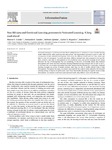Mostrar o rexistro simple do ítem
Non-IID data and Continual Learning processes in Federated Learning: A long road ahead
| dc.contributor.author | Criado, Marcos F. | |
| dc.contributor.author | Casado, Fernando E. | |
| dc.contributor.author | Iglesias Rodríguez, Roberto | |
| dc.contributor.author | Regueiro, Carlos V. | |
| dc.contributor.author | Barro, Senén | |
| dc.date.accessioned | 2022-10-14T17:23:44Z | |
| dc.date.available | 2022-10-14T17:23:44Z | |
| dc.date.issued | 2022 | |
| dc.identifier.citation | M. F. Criado, F. E. Casado, R. Iglesias, C. V. Regueiro, y S. Barro, «Non-IID data and Continual Learning processes in Federated Learning: A long road ahead», Information Fusion, vol. 88, pp. 263-280, dic. 2022, doi: 10.1016/j.inffus.2022.07.024. | es_ES |
| dc.identifier.issn | 1566-2535 | |
| dc.identifier.uri | http://hdl.handle.net/2183/31818 | |
| dc.description.abstract | [Abstract] Federated Learning is a novel framework that allows multiple devices or institutions to train a machine learning model collaboratively while preserving their data private. This decentralized approach is prone to suffer the consequences of data statistical heterogeneity, both across the different entities and over time, which may lead to a lack of convergence. To avoid such issues, different methods have been proposed in the past few years. However, data may be heterogeneous in lots of different ways, and current proposals do not always determine the kind of heterogeneity they are considering. In this work, we formally classify data statistical heterogeneity and review the most remarkable learning Federated Learning strategies that are able to face it. At the same time, we introduce approaches from other machine learning frameworks. In particular, Continual Learning strategies are worthy of special attention, since they are able to handle habitual kinds of data heterogeneity. Throughout this paper, we present many methods that could be easily adapted to the Federated Learning settings to improve its performance. Apart from theoretically discussing the negative impact of data heterogeneity, we examine it and show some empirical results using different types of non-IID data. | es_ES |
| dc.language.iso | eng | es_ES |
| dc.publisher | Elsevier | es_ES |
| dc.relation | Ministerio de Ciencia e Investigacion; PID2020-119367RB-I00 | es_ES |
| dc.relation | Xunta de Galicia; ED431G-2019/04 | es_ES |
| dc.relation | Xunta de Galicia; ED431G2019/01 | es_ES |
| dc.relation | Xunta de Galicia; ED431C 2018/29 | es_ES |
| dc.relation | Xunta de Galicia; ED431F2018/02 | es_ES |
| dc.relation | Xunta de Galicia; ED431C 2021/30 | es_ES |
| dc.relation | Ministerio de Educación, Cultura y Deporte; FPU17/04154 | es_ES |
| dc.relation.uri | https://doi.org/10.1016/j.inffus.2022.07.024 | es_ES |
| dc.rights | Atribución 3.0 España | es_ES |
| dc.rights.uri | http://creativecommons.org/licenses/by/3.0/es/ | * |
| dc.subject | Federated learning | es_ES |
| dc.subject | Data heterogeneity | es_ES |
| dc.subject | Non-IID data | es_ES |
| dc.subject | Concept drift | es_ES |
| dc.subject | Distributed learning | es_ES |
| dc.subject | Continual learning | es_ES |
| dc.title | Non-IID data and Continual Learning processes in Federated Learning: A long road ahead | es_ES |
| dc.type | info:eu-repo/semantics/article | es_ES |
| dc.rights.access | info:eu-repo/semantics/openAccess | es_ES |
| UDC.volume | 88 | es_ES |
| UDC.issue | December | es_ES |
| UDC.startPage | 263 | es_ES |
| UDC.endPage | 280 | es_ES |
Ficheiros no ítem
Este ítem aparece na(s) seguinte(s) colección(s)
-
GI-GAC - Artigos [182]






